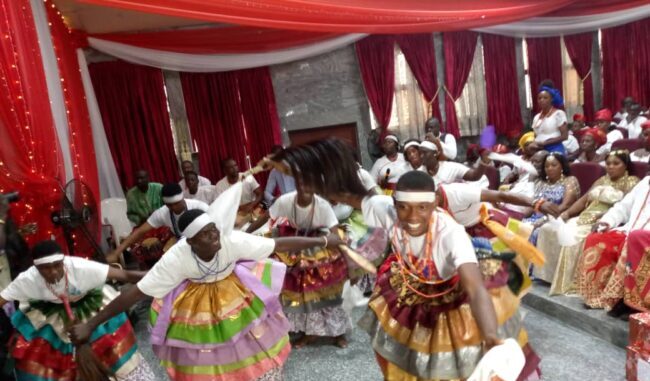
The current lopsided political structure of the Federal Republic of Nigeria is a threat to the very existence and survival of minority ethnic nationalities in the country.
This is the submission of a socio-cultural Itsekiri ethnic group in the Niger Delta, The Ugbarajo Iwere Leaders Foundation, on Tuesday during a lecture to mark the third-year anniversary of the Olu of Warri, Ogiame Atuwatse III.
The group, therefore, advocated for fiscal federalism through the immediate restructuring of Nigeria amid the current existential challenges.
In a communiqué issued at the end of the lecture/symposium with the theme “The Challenges of Minority Ethnic Groups within the Nigerian State,” the group frowned at the over-centralisation of the federal system.
The communique was jointly endorsed by Professor Benson Osadolor, a former Vice Chancellor of Ambrose Alli University; Chief Robinson Ariyo, the Egogo (Mouthpiece) of Warri; and a former member of the National Assembly representing Warri Federal Constituency, Hon. Dan Reyenieju.
The group called on the authorities to tackle, head-on, factors responsible for violence at the various levels of government “by applying best practices for permanent prevention.
“As a result of the challenges that come with critical issues of the control of power and resources, marginalisation, neglect, exclusion, social injustice, and human rights deprivation, the consultation of state intervention can be addressed through restructuring of the Nigerian State.
“The over-centralisation of the federal system is a major threat to minority ethnic populations.
“Therefore, restructuring and true federalism will deepen and strengthen the institutions for governance that will enhance our efforts and commitment to nation-building,” the group averred.
It was argued that the 1999 Constitution of Nigeria “does not recognise the rights of ethnic minorities but the fundamental rights of every individual, which are civil and political in nature.”.
It maintained that “what matters to ethnic minorities is the enforcement of their rights to development and socioeconomic rights through fiscal federalism and intergovernmental relationships.”.
The group, thereafter, itemised some of the disadvantages of the present set-up in Nigeria for the minority ethnic populations.
“Minority populations have been disadvantaged by the Federal Character principles of fairness and equity.
“In the distribution of public posts and socioeconomic infrastructure among the various federating units of the Federal Republic of Nigeria,.
“The implementation and enforcement of the Federal Character Principles has become an object of ridicule due to the predominance of persons from a few states of majority ethnic groups benefiting from recruitments, promotions, and appointments in most ministries, departments, and agencies.
“There has been continuous use and abuse of the Quota system in Nigeria that denies opportunities for the brightest and most brilliant minds of minority ethnic groups for placement in the civil service, military, and higher institutions,” the group further noted.
Earlier in a presentation, Professor Osadolor affirmed that “the challenges of ethnic minorities in the South and North Central of Nigeria are complex and difficult with profound consequences.”
According to him, “Over the years, the North Central has witnessed varying degrees and dimensions of ethnic dominant crises, often resulting in widespread violence and instability, and recently, ethnic cleansing and genocide against ethnic minorities in the North Central.
“Over the years too, the South was a hotbed of conflicts and violence with varying interpretations of the challenge, such as oil and community disorders, the Niger Delta crisis, or simply the minority agitations, or in the context of the national question.”
Professor Osadolor reiterated that restructuring and fiscal federalism if pursued by the current federal government to fruition, could salvage the country from the potpourri of challenges perpetually holding the country down.
ALSO READ THESE TOP STORIES FROM NIGERIAN TRIBUNE









